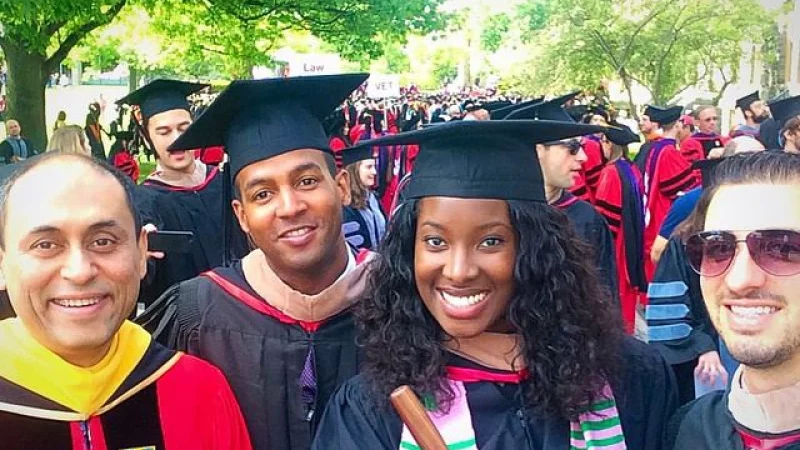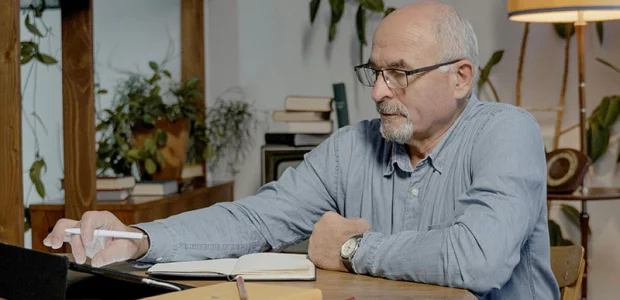
Ahead of our free webinar which will reveal all about studying for an MBA with the Cornell Johnson School of Business, Unimy sat down with Cornell MBA alumnus Solomon Tesfaye to hear about his experience on the program.
We wanted to know: how and when do business professionals decide to do an MBA? Once in the program, how do expectations meet reality? Solomon Tesfaye who leads business development and capital markets at tZERO, the global leader in blockchain technology for capital markets, will share his insights as part of the webinar. Here, he gave us a preview as to what to expect...
Solomon: I would describe my pre-MBA self as execution-focused – like many of my peers were. I was looking to gain momentum in my early career as opposed to taking a step back and looking at where I want to be ten years from now. I was primarily heads-down focused on gaining technical skills and positioning myself to be identified as a high performer.
I was a pre-med undergrad when I first became exposed to business through entrepreneurship. I finished my degree in biological sciences, but in parallel, I got bit by the entrepreneurial bug and upon having some modest early success I was looking to combine my newfound enthusiasm for business with my formal undergrad education. I gravitated toward operational roles within the medical device industry. I had a great experience learning the fundamentals of supply chain, lean operations, and quality control. As I progressed to leadership roles, I realized I was missing some of the business development aspects of my previous entrepreneurial experience. I made a transition into venture capital where I gained insight into the investing process of identifying and evaluating high-potential early-stage investments and entrepreneurs.
Early-stage venture capital positioned me to leverage my strong operations foundation and interest in business development, but it also enabled me to identify gaps in my technical business skillsets. Rather than hoping to organically gain this knowledge within an organization, I felt pausing my career and pursuing an MBA would expedite this learning curve and ensure I gained a comprehensive understanding of the subject matter.
I began visiting and applying to business schools while working at the firm, and I was fortunate enough to get into a number of different programs. I chose to attend Cornell Johnson School of Business due to the tight-knit community, reputation, and emphasis on self-awareness in leadership. I was truly seeking a program that not only had a proven track record of equipping students with the hard skillsets needed, and successful alumni, but also a community that would serve as an incubator where my peers and I could further develop personally and professionally.
Sounds like networking but deeper - having the chance to get those richer connections with people…
Absolutely, it’s very rare in your life to be able to take a step back and join a community where all your peers are looking to accomplish the same goals as you in terms of professional and self-development. You live alongside each other and help each other address areas of development and further amplify core strengths. I view the MBA as a chance to recalibrate yourself and come out the other side with a new skill set, new friends, a new perspective, and greater self-awareness.
Was the MBA experience different than you expected? Was there anything that surprised you?
Before Cornell Johnson School of Business I traveled a lot domestically, but I had not had any meaningful international travel experience due to undergrad sports activities and other commitments. Also, I went to business school fairly young relative to my peers due to the credit I was given for my entrepreneurship experience. I realized that in an MBA you have the chance to travel extensively if you wish. So, I took advantage of all the travel opportunities, and I studied abroad at ESADE in Barcelona during my last semester. The fact that I was able to visit 25+ countries while I was at business school was something I had not anticipated. When I initially envisioned my MBA experience I had not anticipated the opportunity to gain such a global perspective.


Were there any differences in terms of culture when you compare your experiences at Cornell and ESADE?
I enjoyed my time at both great universities, but of course there were differences based on what each program emphasized, their locations, and several other variables. At Cornell Johnson School of Business, New York City is very accessible, but being outside of the city in Ithaca creates this sense of community as you intentionally invest time in developing relationships with your peers and faculty. This is different from other schools that are more commuter schools or programs in the midst of a city where there can be competing priorities that can cause your peers or visiting alumni to quickly disperse after class or events. There are simple advantages to this dynamic. When alumni and/or recruiters visit Cornell Johnson School of Business, they tend to stay overnight and are not in a rush to leave given the distance from New York City, which better positions students to develop genuine connections. That’s a significant contrast to certain programs where they may stay for a couple of hours or less and then leave. So, from a student perspective, but also from a recruiter and alumni perspective, you stand to gain more time with those counterparties. When I was at Citigroup doing investment banking my peers and I used to enjoy coming to Cornell Johnson School of Business because we knew the time would permit us to have meaningful conversations with the student body.
Who were you by the end of the MBA? How did your outlook change?
I left the Cornell Johnson School of Business with a better sense of self-awareness, the strong technical foundation I was seeking to gain, and as a part of a global community of Cornell alumni. When I first came to New York from California, I knew about four people in New York City. When I left the MBA, I had hundreds of relationships in New York City alone, and that network has grown exponentially over the last seven years post-graduation. Many of the relationships established in MBA will develop into lifelong friendships. I have attended many peers’ engagement parties, weddings, baby showers, promotion related events, etc. over the years.
The MBA experience truly enables you to recalibrate, and enter the next stage in your career regardless of what direction that takes. The transitions an MBA can facilitate can be quite a contrast from your previous roles. I have friends who went from Teach for America prior to an MBA to investment banking after it, and others that went from private equity to non-profits. It is rare to be able to make these significant career transitions in shorter periods of time in the absence of an MBA. To do that alongside a supportive community is even rarer.

Choosing the right MBA is not a transactional decision and you should conduct a thoughtful assessment based on your personal requirements and objectives. Cornell Johnson School of Business helped me to refine my outlook from a wide range of perspectives, become more intentional about my leadership decisions, and better positioned me to make my goals and aspirations a reality.
Sign up for the free webinar, VALUE OF A CORNELL MBA: AN ALUMNI PERSPECTIVE, October 5, 10 am ET (GMT -4)


Comments